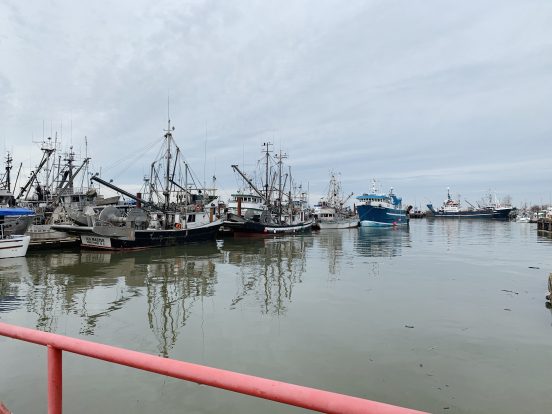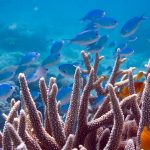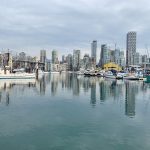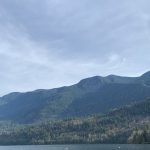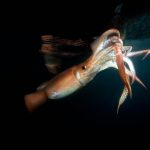Our field trip to Steveston began with meeting Eric, a fisherman and adjunct professor at UBC, at the nearby docks full of local fishing vessels. It was interesting to hear that throughout Eric’s childhood, fishing was very integrated in the culture of the community and meant all the young boys would fish with their fathers during the summer. I enjoyed hearing about the beginning of his involvement in the fishing industry, as he has been fishing since he was a teenager, following in the footsteps of his male family members. Eric’s long-term career has made him a leader in various fishing and conservation organizations, so he was a great person to discuss large scale changes in fishing with. I found it interesting to hear his perspective as someone who holds being a fisherman central to his identity, that he was able to admit that some fishermen like to deflect blame for the stock declines. It reminded me of climate change deniers who often like to find any reason other than humans as to why the climate is changing at such a rapid rate, instead of acknowledging the common denominator, humans.
His honesty was refreshing and it was nice to relate to someone who clearly has a lot of respect for the ocean and prioritizes conservation of marine life. This acted as a great starting point for the day, and allowed us to see the fishing gear and vessel types we’ve discussed in class, in person. A point of confusion I had previously was differentiating trollers and trawlers and the sustainability of each practice. This was cleared up through our discussion and I learned that trollers act by dropping hooks into pelagic regions at a middle depth whereas trawlers drop a weighted, large net to the ocean floor, damaging benthic topography and anything living there. It was beneficial to see what these vessels look like and imagine what the conditions on these boats are like while out at sea. Eric and Amanda indicated that fisheries observers sent out to monitor fishing vessels often experience harassment and dangerous threats so that fishermen can maintain their practices to achieve a large profit. I made a mental note of this as our group had been discussing this type of observer job as a potential future career option, but I am now crossing that off my list.
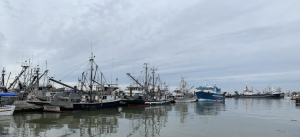
Something I noticed is that the majority of the boats at the dock are given female or female-inspired names. This curiosity was triggered by our guest lecturer, Dr. Danica Kleiber, who informed us of the often neglected role of women in fisheries. It made me wonder about the origin of this practice, since we sometimes see that when we peel back the origins of traditions, they have uncomfortable roots (something we also saw later in distribution of the roles of people working at the Cannery). After some research, I found that in some cases ships are named after admired women or women in the family of the owner, and in other cases, it is because they are likened to mothers. These names rely on the stereotypical role of a woman, to nurture and protect her children. In this case, the ship is looking after the people aboard the boat carrying them safely to their destination. Another origin I found more unsettling was from a passage posted by an unknown author on many vessels in the US:
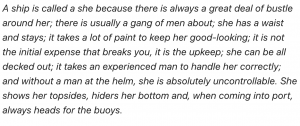
This idea of finding inequalities when you look into history or outdated practices was something I thought more about as we looked through the Cannery part of our field trip. Walking down the canning line we saw clear differences in the roles of some groups of people compared to others. We saw that men were typically the ones out on the water fishing, while the women were involved in cleaning the landed fish. Within the group of women, Indigenous and Asian women were often grouped together working at stations which highlighted the intersection of inequalities based on both gender and race. These are issues I plan to continue learning more about since I have only experienced inequalities based on gender and not race. It encouraged me to broaden my definition of marine conservation outside of only science and policy, because this field trip provided an opportunity to see the social and historical dynamics within this field.
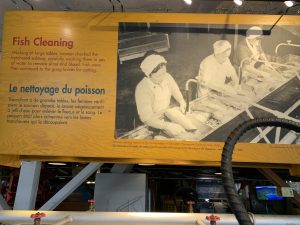
During our visit to the Cannery we had the chance to learn more about the historical events leading up to the creation of this site through a short movie. It was interesting to hear stories from fishermen who have a shared connection to fishing since they have each been in the industry for a few decades. It would have provided a better overall picture to hear a more diverse set of fishermen’s perspectives to better understand how fishing and working at the Cannery impacted their lives and families. In reflecting on our Indigenous issues tutorial with Dr. Andrea Reid, I began to think about the few Indigenous people shown in the film and questioned if there are parts to their experience that we did not learn simply because their stories have not been prioritized throughout history. This was one of the most memorable moments of our field trip as it allowed me to spend more time thinking about how leaving out certain groups from marine conservation and related issues only makes our goals more difficult to reach. Some lingering questions I want to explore include, which fisheries monitoring programs are working successfully and what can we learn from these areas so that fisheries observers onboard ships are not feeling unsafe? How have previous historic events (world wars, political conflict, etc.) informed the current fisheries landscape? How can we prioritize the inclusion of Indigenous knowledge in fisheries planning and policy?
References
Admin. (2017). Why are boats called a ‘she’? | did you know boats. Did You Know Boats | Boats and Boating Information For Those Who Are Interested. Retrieved from https://didyouknowboats.com/why-are-boats-called-a-she/#:~:text=Traditionally%2C%20ships%20are%20given%20female,named%20after%20important%20mortal%20women.&text=It%20also%20played%20an%20important,t%20read%20identify%20a%20ship.
